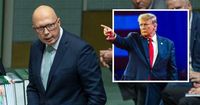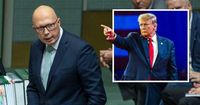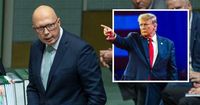Australia's Opposition Leader Peter Dutton has officially committed to increasing defense spending, emphasizing the need to fortify national security in his foreign policy agenda. In a keynote address at the Lowy Institute, Mr. Dutton voiced his intention to prioritize the defense budget by targeting what he calls "Canberra-centric" funding, which he believes hinders effective military preparedness. If elected by May 2025, one of his main priorities would involve meeting with U.S. President Donald Trump to strengthen bilateral relations fostered under the current government.
In his speech delivered on March 20, 2025, Dutton opposed President Trump's recently imposed steel and aluminum tariffs on Australian products, asserting the importance of the United States as Australia's most critical ally. "The best place for Australia to share the burden with the United States is in the Indo-Pacific - the theatre of mutual interest," he stated, underscoring the geopolitical significance of collaboration between the two nations.
While discussing Australia’s defense strategy, Dutton asserted, "By developing our defense capabilities, we do two things. We become a more credible partner to contribute to the objectives of deterrence and peace in our region, and we become more self-reliant and resilient in defending our national interests." His assertive remarks reflect a strategic pivot as Australia considers increasing its defense expenditure to at least 2.5 percent of its GDP by 2029, as reported by the Australian Financial Review.
The anticipated budget announcement, set for March 25, 2025, is a crucial moment for Dutton, who aims to redefine the nation's defense framework. He criticized both U.S. Ambassador Kevin Rudd and Prime Minister Anthony Albanese regarding their relations with Trump, suggesting that past criticisms have led Australia to "pay a price" in international standing while engaging with the U.S.
Among his plans, Dutton also mentioned that he would reaffirm Australia's support for Israel by calling Prime Minister Benjamin Netanyahu as soon as he steps into office. This move is likely intended to solidify relationships with key international allies and signals a clear direction in foreign diplomacy should Dutton ascend to leadership.
Dutton's noteworthy plans rest on a foundation of cutting back on expenditures he deems unnecessary through his proposed "reprioritization" of Canberra-centric funding. He previously indicated that up to $24 billion could be saved if the 36,000 public service jobs added by Labor were eliminated. This strategic pivot has received considerable attention as the party gears up for the forthcoming elections.
As the Australian political landscape evolves, Dutton's approach merges strong rhetoric with actionable plans, emphasizing a retooled defense strategy as he aims to capture voter confidence heading to the polls. Ensuring national security and fortifying relationships with global partners remain at the forefront of his campaign agenda, as the dynamic relationship with the U.S. grows more complex.



